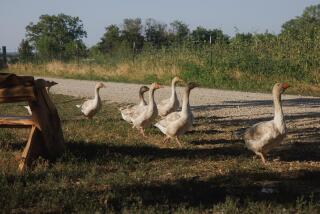Farm Programs Take Root With Consumers
- Share via
PRESCOTT, Ariz. — The buzz begins early in the morning and by noon almost everyone at Prescott College has heard about today’s perfectly ripe, sweet oranges.
For many members of the college’s Community-Supported Agriculture program, Wednesdays are not only about picking up their weekly shares of produce grown at six local farms. It’s also about the mingling between students and faculty, sharing recipes and learning about the freshness food can have when it wasn’t picked too early and shipped 1,500 miles to a warehouse-sized grocery store.
“This is the favorite part of my week and it’s the favorite part of a lot of people’s week,” said Gret Antilla, the dean of Prescott College. She is one of the 72 shareholders arriving each week at the program’s closet-sized produce pickup room.
“Throughout the community . . . whispers go out, ‘Oh, we’ve got chilis today.’ And someone already told me today that we’ve got great oranges,” she said. “So people are sort of bonding over this very basic need, which is food.”
CSAs--which originated in Japan and Europe about 30 years ago--are reminiscent of a time when communities were built around farms, when people had a connection to where their food came from and when they knew firsthand the folks possessing the skilled touch to produce a little magic from dirt and seed.
There are about 1,000 CSAs operating in the United States and Canada.
“It’s a model that has really taken off because it’s filling a need. And that need is a need for the consumers to have contact with the land,” said Tim Crews, an agroecology professor. Crews advised three students who developed the local CSA model as an independent study project last year.
Local “shareholders” each fronted $330 last spring to take part in the first year of Prescott College’s CSA program, now open only to the college’s staff, students and faculty. Next year, Crews expects the number of shareholders to double and there is talk of expanding the program to people outside the college.
Each year the price would differ, depending on the number of participants, the market and what farmers and shareholders agree to have grown. But this year, $330 bought shareholders a variety of fresh produce--all grown within 110 miles of Prescott--delivered once a week from Sept. 1 to May 1.
That works out to a whole lot of produce, teeming with flavor and freshness, for just under $12 a week.
What the farmers get is a guaranteed market and a sense of security in this season’s crop. Shareholders don’t get their money back if weather or another unseen catastrophe destroys the crop, tying the community to the well-being of farmers.
“We get the money in advance too, which is a big thing,” said Frank Martin of Crooked Sky Farms in south Phoenix. A portion of the money paid upfront allows farmers to pay for labor, buy seed, repair equipment and prepare more efficiently for the season ahead of time. If one crop fails, farmers have room to try planting another.
“Now there are people committed to helping this guy stay in business. And that just doesn’t happen unless you form these community relationships,” Crews said, adding that shareholders have an open invitation and are encouraged to visit or help out at the farms.
“Having people go be in touch with where food comes from is step No. 1 toward a more sustainable agriculture and culture in general,” he said. “You protect what you love and what you find dear.”
During one recent week, Martin supplied an organic blend of mixed greens, which CSA organizer Heather Houk came to help wash, bag and pick up, as she does every week for the program.
All the food for the CSA is grown with little or no pesticides, and picked just a day or two before the delivery. It’s a mixed basket each week--shareholders never know what or how much they’re going to get.
One week a share might include leafy kale, juicy red apples and blue potatoes. Another week, shareholders might have to consult one of the recipes provided by the CSA to know what to do with produce they’ve never heard of, such as kohlrabi.
Antilla arrives at the CSA pickup with a friend and grabs a plastic bag at the door. A sign above each bin tells her how much of each to take. She stuffs her bag full with one bunch of carrots, a hearty helping of beets, four oranges, one sweet orange, one large spaghetti squash and a large bag of Martin’s mixed greens.
She samples the greens as she walks from bin to bin, oohing and aahing over the week’s luscious produce.
“We get really great tasting food. This is so much better than the vegetables we get in the store, it’s remarkable,” Antilla said. “By participating in this, it’s truly a win-win situation.”
More to Read
Sign up for Essential California
The most important California stories and recommendations in your inbox every morning.
You may occasionally receive promotional content from the Los Angeles Times.













